Guilie Castillo-Oriard's Blog, page 3
March 15, 2018
Pop Aye: Reviews from the Curaçao Film Festival 2017 #CIFFR
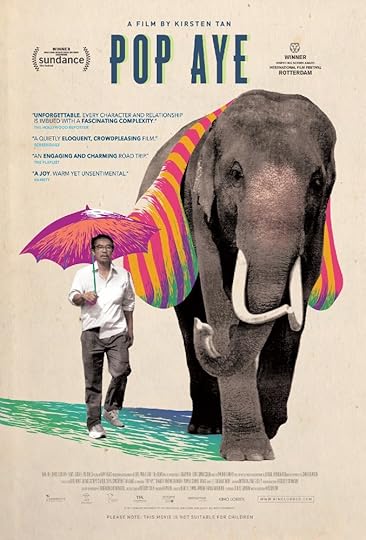 Pop Aye, Beautiful, beautiful movie. A naiveté that stole my heart and made me cry and cry in spite of the (sort of) positive ending. Or maybe it was the elephant.
Pop Aye, Beautiful, beautiful movie. A naiveté that stole my heart and made me cry and cry in spite of the (sort of) positive ending. Or maybe it was the elephant.No, no it wasn't.
Well, not just the elephant. Yes, I loved that pachyderm, and I loved his story, but the magic of this film resides in the narrative style. There's plenty of humor—fine, subtle, often guileless, humor—guaranteed to make you chuckle (and, if you're feeling particularly susceptible, even laugh out loud). But this is a social statement, a critique on the materialistic lifestyles we've somehow managed to convince ourselves we need. And because it is told in such a guileless way, it underlines even more harshly the redundancy of the goals we live and die by.
This is a feel-good movie. Remember to keep the tissues handy at the end, though.
Published on March 15, 2018 04:30
March 13, 2018
Casamance: Reviews from the Curaçao Film Festival 2017 #CIFFR
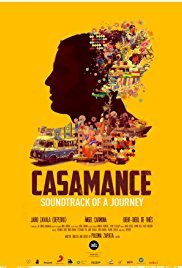 Casamance,
Casamance, Some might think it a tad amateurish (I'm not one of them), but even those can't help being swept away by the magic of music and candor that is this film. Documentaries are difficult to make; unpredictable plots, characters that insist on doing their own thing instead of sticking to the script—oh, wait, no script. Documentaries are about truth: real people, real events, heart and soul given flesh. And the music! An exploration into African rhythms, their history and evolution, and their trasmutation into Latin culture and music... This one had us tapping our feet—and looking into trips to Senegal.
It's almost time for the 2018 film festival, and I am far, far behind on the reviews for the 2017 films! So over the next four weeks I'm going to be posting three or four times a week in order to get through them all. They'll be shorter than originally planned, and I do apologize. Yes, it's a time issue, but it's also what I specifically didn't want to happen: I have forgotten a lot about these beautiful, beautiful films. *Sigh*
Published on March 13, 2018 08:57
January 25, 2018
The #WATWB January Edition: No Space for Sexism — #TimesUp
Here it is, the first We Are The World blog event of the year—and my first post of 2018!
In the spirit of the #MeToo and #TimesUp momentum that saw the old year out and the new year in (and shows no sign of abating; a nod of appreciation, by the way, to Casey Affleck for declining to attend the Oscars this year—let alone hand out the statuettes), I thought I'd start off with a brief but potent story about female empowerment. What makes this story special for me is that it doesn't come from Europe or the U.S. This happened in Sri Lanka, of all places. It underlines that this fight against predatory behavior and sexism in general is a global thing, and I believe it's important to highlight these instances, especially when they're successful, because the only way real change will be effected is by keeping those voices coming, loud and clear. Sing it, sisters—and I'll join my voice to yours.
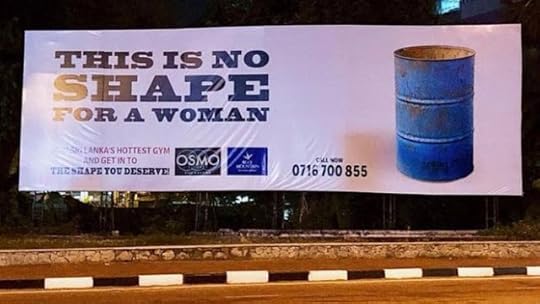
This is the billboard that sparked the controversy in Colombo (Sri Lanka's capital). Yes, I would've been offended by it. But I probably wouldn't have done much about it—aside from boycotting the gym advertised, certainly. If I'd been a member there, I'd have cancelled my subscription. I might even have suggested similar action to a friend or two, if I knew they went there, too. Yes, the gym would've gained a black mark in my book... But that would've been it.
And that's the core of the problem when it comes to sexism, isn't it?
As women, we learn early in life to keep our opinions to ourselves—especially if they're of a belligerent or non-conformist nature. We learn to dismiss the myriad sexist incidents that make us uncomfortable or downright afraid; we learn to protect ourselves, but always discreetly and without rocking the boat. Everything and everyone around us, from pop culture to our closest friends and family, create emphasis on this. This is how the world works. It's always been this way. Nothing we can do to change it.
That may (or may not) be true, but here's what I love about this moment in history: women are refusing, loudly, globally, to remain silent about it. Maybe nothing will change, I mean really change, but just the fact that it's becoming acceptable to speak out is an encouraging sign.
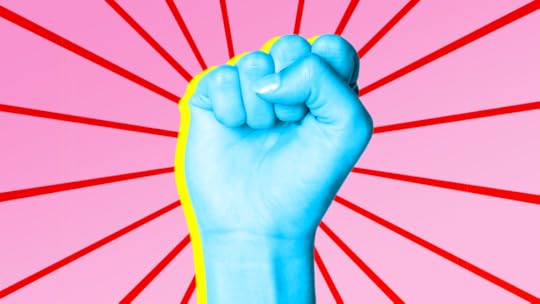
Women in Sri Lanka not only spoke out, they took action. Here's what went down. Sure, it's a far cry from the perfect outcome (the replacement sign put up in protest only stayed in place for one day), but—at least it's happening. There's momentum still.
And it's up to us to keep it going. I don't mean just women; all genders need to participate. This is, after all, a cause for equality, for zero tolerance to discrimination and predatory behavior, for the eradication of objectification culture. And all of us, regardless of gender, stand to benefit from it.
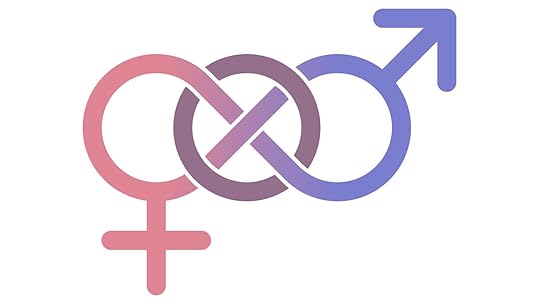
This post is part of the We Are The World blogfest, a monthly event created by Damyanti Biswas and Belinda Witzenhausen that seeks to highlight positive notes—news, stories, developments, discoveries, progress of all sorts—in an effort to keep at bay the hopelessness and negativity so prevalent in the media. This month I'm helping out as a co-host, together with Shilpa Garg, Simon Falk, Eric Lahti, Lynn Hallbrooks, and Damyanti Biswas. Please take a hop over to visit them; excellent content guaranteed to spark a light in your soul. And if you'd like to join us, write a post about a wonderful bit of news and add your blog here or in the Linky List below. Spread the love, and share the hope!

Thanks for coming by, and have a great weekend :)
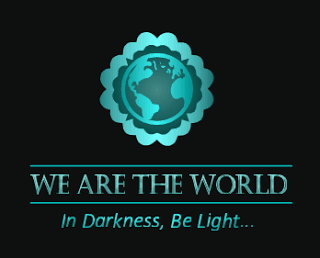
In the spirit of the #MeToo and #TimesUp momentum that saw the old year out and the new year in (and shows no sign of abating; a nod of appreciation, by the way, to Casey Affleck for declining to attend the Oscars this year—let alone hand out the statuettes), I thought I'd start off with a brief but potent story about female empowerment. What makes this story special for me is that it doesn't come from Europe or the U.S. This happened in Sri Lanka, of all places. It underlines that this fight against predatory behavior and sexism in general is a global thing, and I believe it's important to highlight these instances, especially when they're successful, because the only way real change will be effected is by keeping those voices coming, loud and clear. Sing it, sisters—and I'll join my voice to yours.

This is the billboard that sparked the controversy in Colombo (Sri Lanka's capital). Yes, I would've been offended by it. But I probably wouldn't have done much about it—aside from boycotting the gym advertised, certainly. If I'd been a member there, I'd have cancelled my subscription. I might even have suggested similar action to a friend or two, if I knew they went there, too. Yes, the gym would've gained a black mark in my book... But that would've been it.
And that's the core of the problem when it comes to sexism, isn't it?
As women, we learn early in life to keep our opinions to ourselves—especially if they're of a belligerent or non-conformist nature. We learn to dismiss the myriad sexist incidents that make us uncomfortable or downright afraid; we learn to protect ourselves, but always discreetly and without rocking the boat. Everything and everyone around us, from pop culture to our closest friends and family, create emphasis on this. This is how the world works. It's always been this way. Nothing we can do to change it.
That may (or may not) be true, but here's what I love about this moment in history: women are refusing, loudly, globally, to remain silent about it. Maybe nothing will change, I mean really change, but just the fact that it's becoming acceptable to speak out is an encouraging sign.

Women in Sri Lanka not only spoke out, they took action. Here's what went down. Sure, it's a far cry from the perfect outcome (the replacement sign put up in protest only stayed in place for one day), but—at least it's happening. There's momentum still.
And it's up to us to keep it going. I don't mean just women; all genders need to participate. This is, after all, a cause for equality, for zero tolerance to discrimination and predatory behavior, for the eradication of objectification culture. And all of us, regardless of gender, stand to benefit from it.

You cannot buy the Revolution. You cannot make the Revolution. You can only be the Revolution. It is in your spirit, or it is nowhere.
— Ursula K. Le Guin (who, sadly, died this past Monday—but left a plethora of beautiful words behind. A selection of excellent quotes from her books here.)
This post is part of the We Are The World blogfest, a monthly event created by Damyanti Biswas and Belinda Witzenhausen that seeks to highlight positive notes—news, stories, developments, discoveries, progress of all sorts—in an effort to keep at bay the hopelessness and negativity so prevalent in the media. This month I'm helping out as a co-host, together with Shilpa Garg, Simon Falk, Eric Lahti, Lynn Hallbrooks, and Damyanti Biswas. Please take a hop over to visit them; excellent content guaranteed to spark a light in your soul. And if you'd like to join us, write a post about a wonderful bit of news and add your blog here or in the Linky List below. Spread the love, and share the hope!

Thanks for coming by, and have a great weekend :)

Published on January 25, 2018 20:05
December 23, 2017
Perfetti Sconosciuti: Reviews from the Curaçao Film Festival #CIFFR
Perfetti Sconosciuti, This one blew my mind in all the good ways. Four couples meet for dinner (the single guy's date stands him up, so it's seven instead of eight), all of them long-time friends, some even from childhood. The subject of secrets comes up, and someone says there are no secrets at this table. "We know each other too well." But someone else disagrees, and issues a challenge: everyone put your phone on the table, and during the dinner, any messages that come in will be shared or read aloud, and any calls will be answered on speaker. If there are no secrets, then it should be easy enough to do. Right?
I'm not a big fan of comedy, generally, but this one I found spectacular. Probably because it's serious subject matter cleverly disguised as comedy. And the Italian sense of humor lends itself particularly well to not just the subject matter itself but to the device of disguise. It's a brilliant take on these times of social media and communication technology, but doesn't stop there. How well do we know those closest to us?
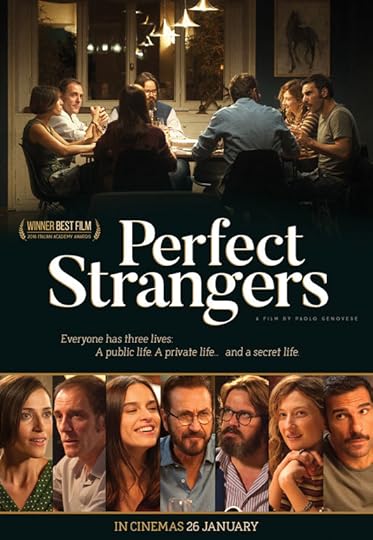
Published on December 23, 2017 09:52
October 26, 2017
The #WATWB October Edition: Tackling the Impossible
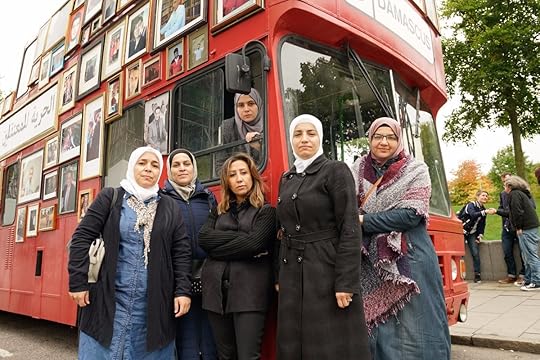 Image source: @FamiliesSyria on Twitter
Image source: @FamiliesSyria on TwitterOn October 11th, the Families for Freedom bus began its journey in London. The iconic double-decker, covered in photographs of Syrians who have been illegally detained, disappeared, and even murdered by the Assad regime, carries the families of these detainees, mostly (but not only) women, in a journey across Europe to call for the release, at the very least for information, of their loved ones. Their next stops will be Paris and Berlin, "wherever peace talks are being held", as their website states.
Their final destination, as the bus so proudly announces above the windshield, is Damascus. To "pick up" their loved ones. The sheer hope in that sign—it blows my mind.
And that's why I decided to use it for my WATWB post this month.
There are few things as hopeless as having someone you care about vanish into a corrupt, totalitarian system. In Latin America we're well versed in the subject—and we know, first-hand, how unfathomable that particular black hole is. We know, also, how distant any possibility of hope seems. And we know, all too well, the excruciating pain hope can bring when it comes any closer.
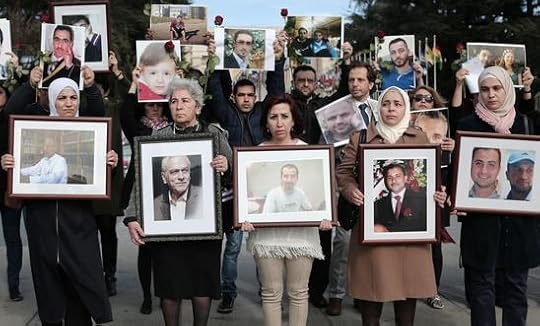 Image source: Amnesty.org.uk
Image source: Amnesty.org.ukAnd yet here they are, these women. Against all odds. Against the whole world. Holding their heads high. Holding on to a ragged shred of hope as tattered and worn as the once-favorite blankie of a grandchild long grown and gone.
We are women-led. We are peaceful. We are determined.
Can you imagine the courage that must take? I try, but I fail. It's staggering, isn't it? And that's why I find it so inspiring: if they can do it, if they can—after years of not knowing, of being turned away, of being silenced and threatened and ignored—still find a way to hold on to hope, then we all can. No matter the odds. No matter how impossible the goal may seem. No matter how many times you've failed. No matter who stands in your way, who tries to drown out your voice. No matter what.
Hopelessness is, quite simply, not an option. And the impossible, as they say, just takes a little bit longer.
This post is part of the We Are the World Blogfest, a monthly event created by Damyanti Biswas and Belinda Witzenhausen to spotlight stories of hope and light. This month I'm helping Belinda out as a co-host, along with extraordinary bloggers Shilpa Garg, Sylvia McGrath, and Mary Giese—please hop over to check out their WATWB posts when you get a chance; they're always amazing. And take a peek at the other WATWB participants for a dose of feel-good to last you a whole month. You'll be happy you did :)
Thank you so much for the visit!

Published on October 26, 2017 19:48
October 3, 2017
Julieta: Film Reviews from the Curaçao Film Festival #ciffr
 Julieta, Pedro Almodóvar, 2016
Julieta, Pedro Almodóvar, 2016CIFFR: Thurs Apr 6, 2017
Almodóvar is a little like Quentin Tarantino for me. No, not in style. I mean in the sense that I either adore or abhor their films. No in-between, no middle grounds... Tarantino and Almodóvar, to me, are either geniuses or morons, depending on what film we're talking about. (To be fair, I do like many more Almodóvar films than I do Tarantino ones.)
When I saw Julieta on the film festival roster, and even after reading the (raving) reviews online, I wasn't sure what to expect. Also, this was going to be Cor's first Almodóvar film (I'm still trying to understand how I allowed an entire decade together to pass before I made formal introductions), so I was torn between singing Pedro's praises and toning it down enough to manage expectations, in case it turned out to be a bomb of epic proportions. (Because, let's face it, when Almodóvar bombs, he does it in Miltonian grandiosity.)
But he did not bomb. Julieta will be remembered as one of his masterpieces, along with Volver (2006) and Átame ("Tie Me Up, Tie Me Down", 1989)—and a few of his coming productions-to-be, since this film evidences a newfound maturity that will surely bring us many, many more riveting stories and extraordinary filmmaking.
(And, yes, Cor loved it, too.)
I'm constantly amazed at Almodóvar's uncanny insight into the depths of the female soul. Especially when it comes to mother-daughter relationships. He's done it before, in Tacones Lejanos ("High Heels", 1991), in Todo Sobre Mi Madre ("All About My Mother", 1999), in Volver, certainly—a film which was hailed as "an ode to female resilience" (Wikipedia). And he did it again with Julieta.
"It's a mystery, but he can feel how we feel and how we are."
An absolutely brilliant, brilliant film. Looking forward to the next one, Pedro!
Have you seen it, or are you planning to? I'd love to know what you think if/when you do.
Published on October 03, 2017 03:00
October 1, 2017
The #WATWB September Edition: On Earthquakes and the Soul of a Nation (#FuerzaMéxico)
Every year on the 19th of September, Mexico City commemorates the anniversary of the 1985 earthquake that leveled the city, and honors those who perished, those who survived, and—perhaps most especially—the millions who took part, over days and weeks and even months, in the search and rescue efforts to find the missing and, later, to rebuild not just the city but the lives devastated by those three minutes the earth shook.
 Tlatelolco (Mexico City), 1985The commemoration includes, every year, an evacuation drill that takes place at 11:00 am. The alarms of the early-warning system sound, and every building in the city empties, people stand in groups in the street until they're given the all-clear, and then everyone mills back up into their offices and cubicles to wait for the evacuation assessment. How fast did we do it? Where did we screw up? What can we do to make it faster, safer, better?
Tlatelolco (Mexico City), 1985The commemoration includes, every year, an evacuation drill that takes place at 11:00 am. The alarms of the early-warning system sound, and every building in the city empties, people stand in groups in the street until they're given the all-clear, and then everyone mills back up into their offices and cubicles to wait for the evacuation assessment. How fast did we do it? Where did we screw up? What can we do to make it faster, safer, better?
This year, when the alarms sounded again at just past 1:15pm, most people thought it was another drill. Or a malfunction.
It wasn't.
Mexico City is no stranger to earthquakes. Being built on the bed of what once was Lake Texcoco, the city sits on sandy and clayey soil that amplifies any seismic activity. After 1985, building regulations changed drastically, an early warning system was implemented, evacuation drills were practiced and perfected, and for 32 years the city suffered no major damages, structural or human, during quakes.
Until eleven days ago. Over three hundred people dead, and counting. Search and rescue efforts are ongoing. Corruption has been revealed and documented, much to the chagrin and embarrassment of politicians and public servants. Lives have been turned upside down, the damage to the city will take months to assess fully, and reconstruction will take millions of dollars. Mexico is in mourning.
But they're far from paralyzed.
Instead, there's this:
And all this is happening without—perhaps even in spite of—the government.
The feeling all around the city, even as far as Cuernavaca, the capital of Morelos (where the epicenter was located) and also damaged, though not as badly as Mexico City, is that Mexicans are taking back the country. For a long time, mainly because of that apathy I talked about earlier, we believed we did, in fact, deserve the government we had. That there were more bad people than good. And therefore that the good ones had no hope. But today there is an undercurrent of optimism, of potential: the evidence—the Topos, the volunteers, the selflessness—seems to prove the old sentiments wrong. The good ones seem to be everywhere. And the bad ones easily identifiable in their government buildings, wearing their silence and sheer ineptitude in the face of a crisis right out on their sleeve for the whole world to see.
In the trenches, all these long days and late nights of working shoulder to shoulder, regardless of color or religion or education or socioeconomic background, have revealed a brotherhood we had perhaps forgotten, perhaps chosen to ignore, perhaps been swindled into betraying. There is hope, today, that this brotherhood, these sentiments of unity and shoulder-to-shoulder equality, may become the driving force for the change—the awakening—Mexico so desperately needs.
Y que viva México, cabrones!
Late at night, hundreds of rescuers, some military, some professionals, most simply volunteers, finally get confirmation that there is no one else trapped in the collapsed building. Instead of giving in to the exhaustion I'm sure permeated every muscle of their bodies, they all stood proud and straight and launched into a spontaneous rendition of the Mexican national anthem.
I am beyond proud to be Mexican.
Want to help México? The New York Times has a good list of organizations that are doing extraordinary work. My personal favorite, also included in the NYT list, is the Topos ("moles" in Spanish). They're heroes without capes—but with plenty of superpowers. CNN did a great piece on them, if you want to find out more. Or you can choose to "stay" (symbolically only, for obvious reasons) in housing damaged by the earthquake. Arriba México, via Cadena.ngo, will direct all proceeds to the fund for rebuilding. In advance, and on behalf of all Mexicans, mil gracias!

This post is part of the We Are The World Blogfest, a monthly event intended to seek out stories of hope and light. If you need more brightness in your life, hop on over to the other participants for a healthy dose of feel-good and inspiration.
Thanks for stopping by!
 Tlatelolco (Mexico City), 1985The commemoration includes, every year, an evacuation drill that takes place at 11:00 am. The alarms of the early-warning system sound, and every building in the city empties, people stand in groups in the street until they're given the all-clear, and then everyone mills back up into their offices and cubicles to wait for the evacuation assessment. How fast did we do it? Where did we screw up? What can we do to make it faster, safer, better?
Tlatelolco (Mexico City), 1985The commemoration includes, every year, an evacuation drill that takes place at 11:00 am. The alarms of the early-warning system sound, and every building in the city empties, people stand in groups in the street until they're given the all-clear, and then everyone mills back up into their offices and cubicles to wait for the evacuation assessment. How fast did we do it? Where did we screw up? What can we do to make it faster, safer, better?This year, when the alarms sounded again at just past 1:15pm, most people thought it was another drill. Or a malfunction.
It wasn't.
Mexico City is no stranger to earthquakes. Being built on the bed of what once was Lake Texcoco, the city sits on sandy and clayey soil that amplifies any seismic activity. After 1985, building regulations changed drastically, an early warning system was implemented, evacuation drills were practiced and perfected, and for 32 years the city suffered no major damages, structural or human, during quakes.
Until eleven days ago. Over three hundred people dead, and counting. Search and rescue efforts are ongoing. Corruption has been revealed and documented, much to the chagrin and embarrassment of politicians and public servants. Lives have been turned upside down, the damage to the city will take months to assess fully, and reconstruction will take millions of dollars. Mexico is in mourning.
But they're far from paralyzed.
Instead, there's this:
And all this is happening without—perhaps even in spite of—the government.
The feeling all around the city, even as far as Cuernavaca, the capital of Morelos (where the epicenter was located) and also damaged, though not as badly as Mexico City, is that Mexicans are taking back the country. For a long time, mainly because of that apathy I talked about earlier, we believed we did, in fact, deserve the government we had. That there were more bad people than good. And therefore that the good ones had no hope. But today there is an undercurrent of optimism, of potential: the evidence—the Topos, the volunteers, the selflessness—seems to prove the old sentiments wrong. The good ones seem to be everywhere. And the bad ones easily identifiable in their government buildings, wearing their silence and sheer ineptitude in the face of a crisis right out on their sleeve for the whole world to see.
In the trenches, all these long days and late nights of working shoulder to shoulder, regardless of color or religion or education or socioeconomic background, have revealed a brotherhood we had perhaps forgotten, perhaps chosen to ignore, perhaps been swindled into betraying. There is hope, today, that this brotherhood, these sentiments of unity and shoulder-to-shoulder equality, may become the driving force for the change—the awakening—Mexico so desperately needs.
Y que viva México, cabrones!
Late at night, hundreds of rescuers, some military, some professionals, most simply volunteers, finally get confirmation that there is no one else trapped in the collapsed building. Instead of giving in to the exhaustion I'm sure permeated every muscle of their bodies, they all stood proud and straight and launched into a spontaneous rendition of the Mexican national anthem.
I am beyond proud to be Mexican.
Want to help México? The New York Times has a good list of organizations that are doing extraordinary work. My personal favorite, also included in the NYT list, is the Topos ("moles" in Spanish). They're heroes without capes—but with plenty of superpowers. CNN did a great piece on them, if you want to find out more. Or you can choose to "stay" (symbolically only, for obvious reasons) in housing damaged by the earthquake. Arriba México, via Cadena.ngo, will direct all proceeds to the fund for rebuilding. In advance, and on behalf of all Mexicans, mil gracias!

This post is part of the We Are The World Blogfest, a monthly event intended to seek out stories of hope and light. If you need more brightness in your life, hop on over to the other participants for a healthy dose of feel-good and inspiration.
Thanks for stopping by!
Published on October 01, 2017 15:46
August 26, 2017
The #WATWB August Edition: On Hope & the Worthiness of the Effort It Takes
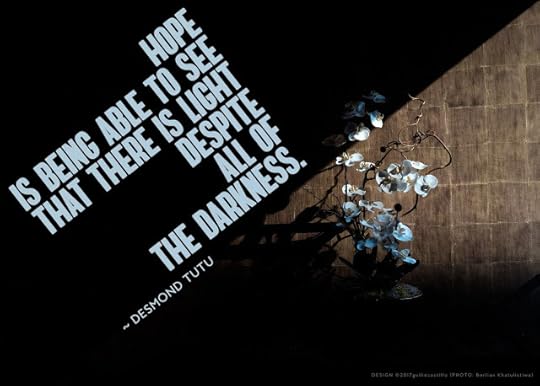 Photo by Berlian Khatulistiwa (Unsplash). Typography by Guilie Castillo.It's been a hard couple of months, and it hasn't been easy to focus on the positive. Last month, in fact, I found it impossible (one of our dogs died). And then the drama with North Korea started. The situation in Venezuela got much, much worse (Curaçao is like 75 km off the VEN coast)—including a threat of military action from the US and, just yesterday, new financial sanctions. And then there's that spate of white supremacist rallies and demonstrations wreaking havoc in the US.
Photo by Berlian Khatulistiwa (Unsplash). Typography by Guilie Castillo.It's been a hard couple of months, and it hasn't been easy to focus on the positive. Last month, in fact, I found it impossible (one of our dogs died). And then the drama with North Korea started. The situation in Venezuela got much, much worse (Curaçao is like 75 km off the VEN coast)—including a threat of military action from the US and, just yesterday, new financial sanctions. And then there's that spate of white supremacist rallies and demonstrations wreaking havoc in the US.Is it any wonder that I'm still struggling to find the light? Maybe not. But I have a choice, don't I? I can allow myself to sink into the darkness, to lose the fragile hold I have on hope, to give in to despair. Or... I can make an effort. Grasp that hope tighter. Feed my strength with the superfood of finding the good in the world.
Which is why the We Are The World blogfest, a monthly event that seeks to spotlight the good stories, the positive outcomes, the reasons for hope, is all the more important. And important, too, that I—that all of us—make the effort to find those stories.
Those outcomes.
Those reasons.
Even if it's something small, something tiny and apparently insignificant compared to the enormity of everything else. Every bit of hope helps. Every bit of feel-good we're able to muster, even if only for a moment, pushes the darkness back. And, inch by inch, we'll gain ground. Because, finally, this is about keeping alive not just the ideals but the reality of the world we want: a world of light, and of hope.

And it starts with us. Be the light you want to see in the world, right? In order to be any kind of light, though, we need to keep that spark alive in our own consciousness.
Anyway. They're being taken down. Reason prevails.
On a lighter note, one of our rescue dogs here in Curaçao went viral last month! Okay, "viral" may be something of an exaggeration, but Jules—that's the name of the dog—got his story covered by three European newspapers and several videos on YouTube. This is fabulous for two reasons: first, because it spotlights the work of rescuers here, and given that a large percentage of these rescues are adopted in Europe (not enough homes here, or enough people who care), that spotlight means more potential adopter families can be reached—and thus more Curaçao rescue dogs can find a first-world forever home!
The second reason, though, is just as important. The spotlight also falls on the organization that did the rescue (and fostering, and healing), Rescue Paws Curaçao. They're relatively new, and I'm very happy to see them getting attention (and, hopefully, more donations to help them help more dogs). They do fantastic work, as you can see for yourself in the video. Jules was in really bad shape, and they managed to capture his transformation—not just physical but emotional—in brilliant, heartwarming detail.
(If you watch the video on YouTube, you'll be able to read his whole story in the description.)
So Jules became famous. He was featured in several Dutch newspapers as well as the Irish News and on The Independent's (UK) Facebook page. Hopefully all this attention will help him get a forever home.
More than that, however, Jules's story—and that of all the countless little ones like him, who've made a comeback from the brink of death and starvation and have found the strength to live, to trust, to love—is, for me, the best proof that hope is worth all the effort it may cost us to connect with it.
To close, and because nothing—nothing—beats darkness like laughter...
 See more funny vet signs at Inspiremore.com
See more funny vet signs at Inspiremore.comThank you so, so much for reading. If all, or even some, of the above managed to make you feel better about the state of the world today, please do hop over to visit the other We Are The World participants for amazing and uplifting stories galore. Who knows, you might even have something amazing and uplifting to share yourself, in which case please join in the blog-hoppin' fun! You can add your linky below, and check out the #WATWB guidelines here. Thanks also to awesome hop hosts Damyanti Biswas and Belinda Witzenhausen, and to this month's co-hosts: Simon Falk, Inderpreet Uppal, Lynn Hallbrooks, Eric Lahti, and Mary J Giese. Hurrah, y'all, for your efforts in spreading the light!

Published on August 26, 2017 15:22
August 20, 2017
The Other Side of Hope: Film Reviews from the Curaçao Film Festival #ciffr
The Other Side of Hope
, a film from Finnish director
Opening nights at the film festival are always fun. Plenty of people show up dressed to the nines: women in glittery makeup, glittery shoes, glittery clothes; men in not-quite-so-glittery blazers and even ties. We, of course, wore our standard-issue jeans and flip-flops, and carried bulky sweaters to brave the gelid air conditioning in the theater. We weren't alone; one of the most salient points of beauty and wonder here in Curaçao, at least for me, is the fact that no one really cares what other people wear. Having grown up in Mexico, and especially in Cuernavaca, the kind of place where other people's clothes (and cars, and houses, and jobs, and children, and parents, and friends, and...) take up a good chunk of the collective consciousness, you can imagine how refreshing Curaçao's live and let live attitude feels to me. I find it enchanting to see a woman in shantung and diamonds in earnest conversation with one in dreads and cut-off jeans. No sneaky up-and-down glances, no secret smirks of disapproval or even judgment. None.
Beyond that particular cultural quirk, festival opening night is also fun because the director of the festival is there to not just introduce the opening film but also to give a short speech that sets the tone for the entire event. This year he spoke eloquently on the issue of immigration and refugees, on war and tragedy and the empathy the world needs to — must, really — exercise in order to heal, and in condemnation of intolerance in all senses and ways.
Which left us all primed for a wonderful, wonderful film.
But there was more to come. The actor who plays the Syrian immigrant,
Given the seriousness of the subject, and in spite of the "comedy" label, I truly was expecting a serious film. It's not cluelessness (well, it is, but not just); rather, I think I'm somewhat biased against comedy as a genre, and the reviews on this one were absolutely raving. So I simply assumed...
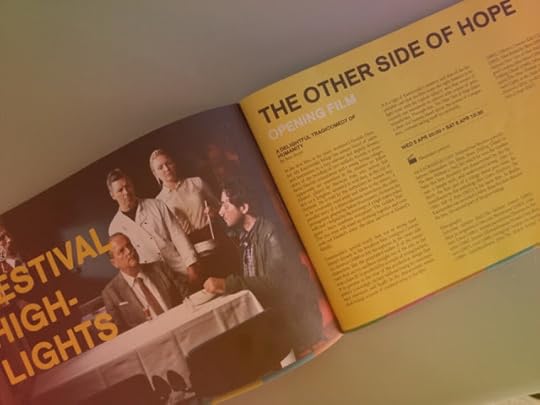
What we got was, yes, a film chock-full of humor of the finest, most subtle kind. Not cynical, not satyrical (well, mostly not), not dumbed-down, not over-the-top, not vulgar, not... well, none of the things that turn me off comedy, really. And yet it is laugh-out-loud funny. Up until the end, that is. I walked out of the theater in tears, and they weren't happy tears. And that, right there, is the core of the success of this film: it portrays the drama of immigration in all its absurdity (the xenophobia, the bureaucracy, the dreams, the sheer helplessness of being at the mercy of an alien culture and its laws), and in all its tragedy. And the reason the tragedy feels so real—palpable, personal—is precisely because it is couched in this seemingly light-hearted envelope. The absurdity (and the hilarity it entails) adds, finally, to the tragedy. And the tragedy takes on a wholly new dimension because of the vehicle of comedy it's delivered in.
It is a masterful achievement. Then again, Kaurismäki has spoiled us to expect nothing less.
If you want to read more about the film, this Guardian review hits pretty much the same context as my take, and it includes more details of the story itself.
Opening nights at the film festival are always fun. Plenty of people show up dressed to the nines: women in glittery makeup, glittery shoes, glittery clothes; men in not-quite-so-glittery blazers and even ties. We, of course, wore our standard-issue jeans and flip-flops, and carried bulky sweaters to brave the gelid air conditioning in the theater. We weren't alone; one of the most salient points of beauty and wonder here in Curaçao, at least for me, is the fact that no one really cares what other people wear. Having grown up in Mexico, and especially in Cuernavaca, the kind of place where other people's clothes (and cars, and houses, and jobs, and children, and parents, and friends, and...) take up a good chunk of the collective consciousness, you can imagine how refreshing Curaçao's live and let live attitude feels to me. I find it enchanting to see a woman in shantung and diamonds in earnest conversation with one in dreads and cut-off jeans. No sneaky up-and-down glances, no secret smirks of disapproval or even judgment. None.
Beyond that particular cultural quirk, festival opening night is also fun because the director of the festival is there to not just introduce the opening film but also to give a short speech that sets the tone for the entire event. This year he spoke eloquently on the issue of immigration and refugees, on war and tragedy and the empathy the world needs to — must, really — exercise in order to heal, and in condemnation of intolerance in all senses and ways.
Which left us all primed for a wonderful, wonderful film.
But there was more to come. The actor who plays the Syrian immigrant,
Given the seriousness of the subject, and in spite of the "comedy" label, I truly was expecting a serious film. It's not cluelessness (well, it is, but not just); rather, I think I'm somewhat biased against comedy as a genre, and the reviews on this one were absolutely raving. So I simply assumed...

What we got was, yes, a film chock-full of humor of the finest, most subtle kind. Not cynical, not satyrical (well, mostly not), not dumbed-down, not over-the-top, not vulgar, not... well, none of the things that turn me off comedy, really. And yet it is laugh-out-loud funny. Up until the end, that is. I walked out of the theater in tears, and they weren't happy tears. And that, right there, is the core of the success of this film: it portrays the drama of immigration in all its absurdity (the xenophobia, the bureaucracy, the dreams, the sheer helplessness of being at the mercy of an alien culture and its laws), and in all its tragedy. And the reason the tragedy feels so real—palpable, personal—is precisely because it is couched in this seemingly light-hearted envelope. The absurdity (and the hilarity it entails) adds, finally, to the tragedy. And the tragedy takes on a wholly new dimension because of the vehicle of comedy it's delivered in.
It is a masterful achievement. Then again, Kaurismäki has spoiled us to expect nothing less.
If you want to read more about the film, this Guardian review hits pretty much the same context as my take, and it includes more details of the story itself.
Published on August 20, 2017 12:42
July 2, 2017
The #WATWB June Edition: Celebrating Diversity
 Love rules!!!!
Love rules!!!!June 30th, was a landmark day for Europe. The German parliament voted to legalize same-sex marriage after an emotional, if brief, debate that resulted in a 393-vs.-226 vote in favor. After three decades of the struggle for equality, and especially given the present rise of conservative policies worldwide, this victory for equality comes as a beautiful, and much-needed, source of hope for a more inclusive climate everywhere. As one member of the German parliament put it during the opening debate, with the legalization of gay marriage "many will receive something, but nobody will have something taken away.” (Thomas Oppermann, parliamentary leader of the Social Democrats)
June 30th also brought cause for celebration on a more personal, but still related, note: my dushi celebrated 20 years since coming to live in Curaçao. He never imagined, back then, that he'd stay on this rock so long; like most financial services employees, he came to the island with a three-year contract, and he hadn't given much thought to what he'd do after. But Curaçao won him over rather quickly. People who had arrived around the same time he did began leaving: to other financial centers, back to Holland, or changing career tacks, marrying and moving away... And, year after year, farewell party after farewell party, Cor stayed. He was offered a couple of good opportunities elsewhere, but—for one reason or another—he ended up turning them down. (Which was a good thing; otherwise we might never have met.)
Curaçao does that to some people. Not to everyone, maybe not even to the majority of expats and immigrants who come here. Lots of people have a hard time with the island; many never adapt, several can't wait for their contract to be up so they can leave. The smallness, the endemic limitations, the heat, you name it: there are plenty of reasons to dislike living here. But, for some of us, the cons can't hold a candle to the pros.

The pros might seem obvious; we're a Caribbean island, after all. Sun, sea, flip-flops and shorts, seafood and ice-cold beer, feet in the sand, cocktails with umbrellas in them. Not to undervalue these, but... well, pretty much any seaside destination offers variations thereof. No, what makes Curaçao special—truly special—has to do with diversity. Over 50 nationalities live here; all religions are present, all cultures, all colors. Just imagine the variety of delicious cuisine we have! And food becomes a metaphor for all sorts of wonderful things. No, Curaçao is no melting pot; that would imply a homogeneity of flavor and texture that would become antithesis to diversity. Food, however, says it best: flavors meet in combinations that build on each other, that borrow from each other not just to improve but to broaden the experience. Our experience. Our selves.
Today, July 2nd, the island is celebrating Dia di Bandera (Flag Day), and our new Prime Minister—a man who stands for diversity and inclusivity—posted this message on his Facebook page:
TRANSLATION FROM PAPIAMENTU (mine): "Our island is very diverse. People from different origins, cultures, and religions, together forming a nation which is unique. Which lives from union, united in our diversity. We are proud to live together with each other, here in our dushi Curaçao. Let's keep caring for and supporting each other, so that we can all continue prospering, together under one flag. Happy Flag Day."
And this year it's an especially happy celebration for Kòrsou: our soccer team won the Caribbean Cup last week—for the first time! EVER! It was the first time they even made it to the final. That footage in Mr. Prime Minister's video above showing the crowds waving little flags are from the welcome the team got at the airport Tuesday evening. Yes, we're very, very proud of them.
 Celebrations at Brionplein last Tuesday, when the Curaçao soccer team returned to the island after winning the Caribbean Cup — for the first time in history!
Celebrations at Brionplein last Tuesday, when the Curaçao soccer team returned to the island after winning the Caribbean Cup — for the first time in history!But I digress. The point I'm trying to make here is about diversity, and about how sharing space—a city, a nation, a life—with others, with very different others, is no impossible dream. Curaçao is living proof of that. This island is far from perfect—same-sex marriage, for instance, is still not legal here—and there's certainly room for improvement on all sorts of areas (corruption is a big, big problem; illegal immigration is, too, and there's still a lot of unresolved conflict with Holland), but the thing that makes Curaçao different from other diverse places is the attitude. In Curaçao, difference is normal. No one expects anyone else to be the same as they are. Diversity in background and religion is a given; people take it in stride, take it even for granted: everyone is different. It's not just how it is, but how it should be. And people here do, mostly, get the enormous benefits of a diverse society.
I have hope that the world will, one day, not too far away, take the hint and follow the example.
Curaçao's national anthem (original Papiamentu, with the English translation—mine, don't quote me—in italics):
Lantá nos bos ban kanta
Raise our voices to sing
grandesa di Kòrsou;
the greatness of Curaçao
Kòrsou, isla chikitu,
Curaçao, small island,
baranka den laman!
cliffs at arm's reach
Kòrsou, nos ta stima bo
Curaçao, we love you
ariba tur nashon.
above all nations.
Bo gloria nos ta kanta
Your glory we sing
di henter nos kurason.
with our whole heart.
Nos pueblo tin su lucha,
Our people have our struggles,
ma semper nos tin fé
but always we have faith
di logra den tur tempu
we'll achieve every time
viktoria ku trabou!
victory with our toils!
Ban duna di nos parti
Let's do our part
p'e isla prosperá.
so the island may prosper.
Laga nos uni forsa
Let us join forces
p'asina triunfá.
in order to triumph.
Nos patria nos ta demostrá
To our homeland we show
Honor i lealtat,
honor and loyalry,
meskos na e bandera
same as we do to our flag
union di nos nashon.
union of our nation.
Nos bida lo ta poko
Our life is a small thing
pa duna nos pais,
to give to our country,
luchando uní pa libertat,
fighting together for freedom,
amor i komprenshon.
love, and understanding.
I ora nos ta leu fo'i kas
And when we are far from home
nos tur ta rekordá
we all remember
Kòrsou, su solo i playanan,
Curaçao, its sun and beaches,
orguyo di nos tur.
pride of us all.
Laga nos gloria Kreador
Let us give glory to the Creator
tur tempu i sin fin,
always and endlessly,
k'El a hasi nos digno
that He has made us worthy
DI TA YU DI KÒRSOU!
OF BEING CHILDREN OF CURAÇAO!
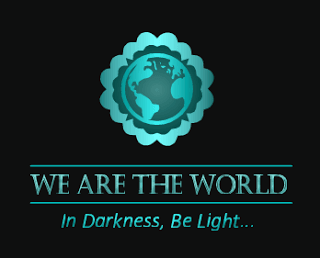
This post is part of the We Are The World monthly blog hop, an effort to change the focus of our ill-riddled world to hope and positivity, hosted by the most excellent Damyanti Biswas, of Daily Write fame, and co-hosted this month by Belinda Witzenhausen, Lynn Hallbrooks, Michelle Wallace, Sylvia McGrath, Sylvia Stein
Published on July 02, 2017 14:34



